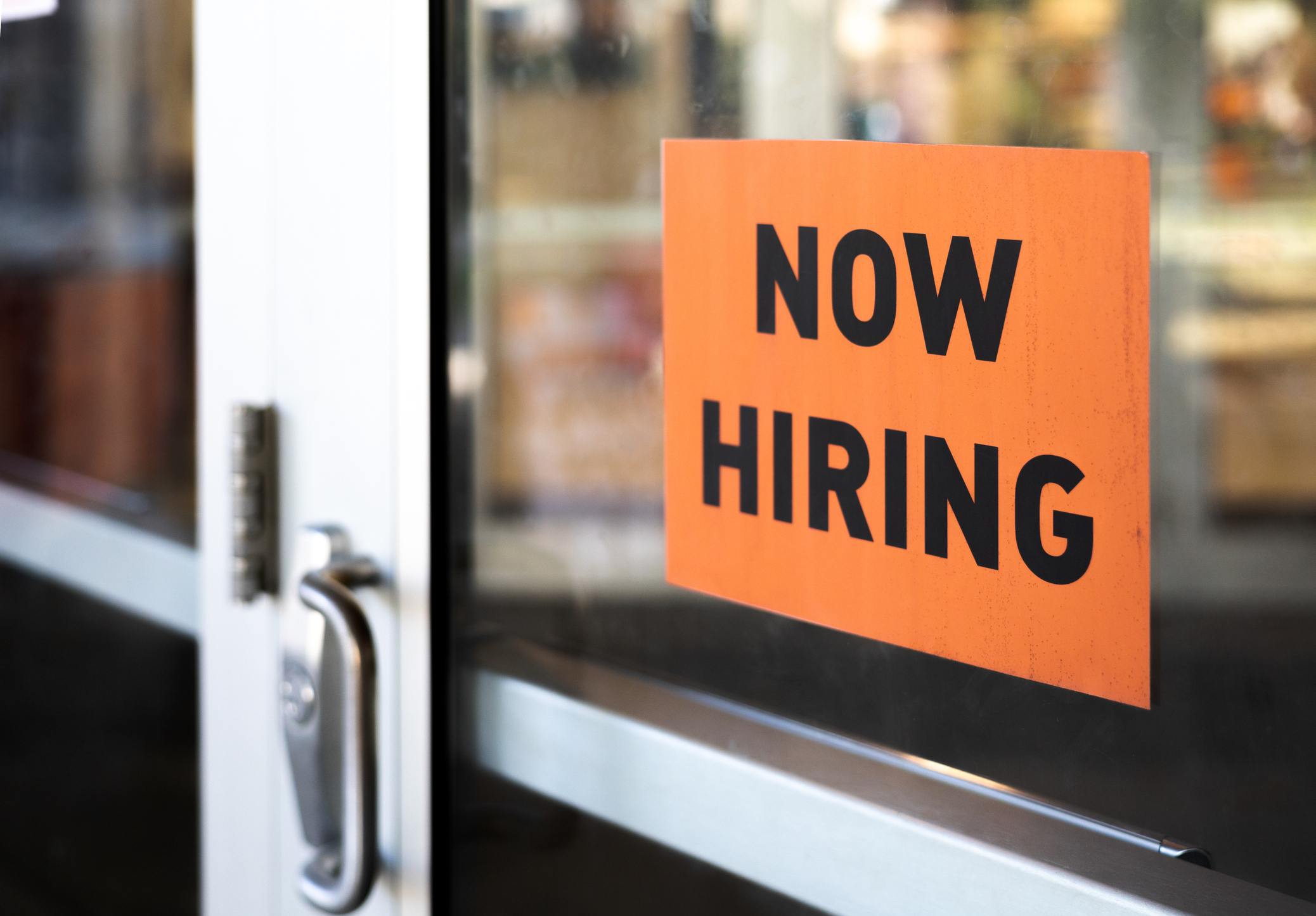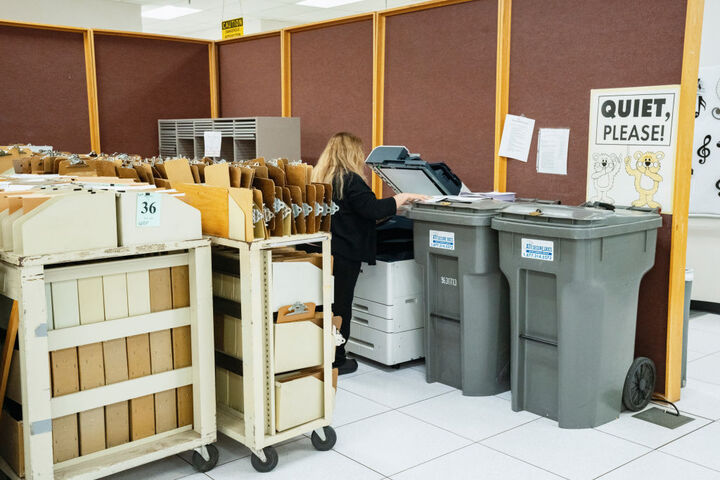The Big CPA Shortage Problem in Accounting: What it Means for Your Tax Return
This once resilient accounting industry is cracking, as the labor force seems in dire straits. It’s also affecting the IRS.


Profit and prosper with the best of Kiplinger's advice on investing, taxes, retirement, personal finance and much more. Delivered daily. Enter your email in the box and click Sign Me Up.
You are now subscribed
Your newsletter sign-up was successful
Want to add more newsletters?

Delivered daily
Kiplinger Today
Profit and prosper with the best of Kiplinger's advice on investing, taxes, retirement, personal finance and much more delivered daily. Smart money moves start here.

Sent five days a week
Kiplinger A Step Ahead
Get practical help to make better financial decisions in your everyday life, from spending to savings on top deals.

Delivered daily
Kiplinger Closing Bell
Get today's biggest financial and investing headlines delivered to your inbox every day the U.S. stock market is open.

Sent twice a week
Kiplinger Adviser Intel
Financial pros across the country share best practices and fresh tactics to preserve and grow your wealth.

Delivered weekly
Kiplinger Tax Tips
Trim your federal and state tax bills with practical tax-planning and tax-cutting strategies.

Sent twice a week
Kiplinger Retirement Tips
Your twice-a-week guide to planning and enjoying a financially secure and richly rewarding retirement

Sent bimonthly.
Kiplinger Adviser Angle
Insights for advisers, wealth managers and other financial professionals.

Sent twice a week
Kiplinger Investing Weekly
Your twice-a-week roundup of promising stocks, funds, companies and industries you should consider, ones you should avoid, and why.

Sent weekly for six weeks
Kiplinger Invest for Retirement
Your step-by-step six-part series on how to invest for retirement, from devising a successful strategy to exactly which investments to choose.
Where are the accountants?
With tax season underway, taxpayers may have noticed the accounting shortage in recent years. As more accountants retire or abandon the industry, it’s been harder for folks to find a reliable CPA in their state or city. The lack of new talent climbs all the way to the IRS, as the agency has cited staffing-related problems for several years.
Those concerns may grow firmer now as President Donald Trump recently ordered a hiring freeze in the federal government, including the IRS. Putting further strain on the industry are GOP lawmakers floating plans to abolish the IRS and rewrite the tax code.
From just $107.88 $24.99 for Kiplinger Personal Finance
Become a smarter, better informed investor. Subscribe from just $107.88 $24.99, plus get up to 4 Special Issues

Sign up for Kiplinger’s Free Newsletters
Profit and prosper with the best of expert advice on investing, taxes, retirement, personal finance and more - straight to your e-mail.
Profit and prosper with the best of expert advice - straight to your e-mail.
The CPA shortage may impact taxpayers like you this 2025 tax season. Here are some reasons why the accounting industry, and even the IRS, is struggling to hire.
Related: Tax Pros: Is Someone Fraudulently Using Your Expired IRS PTIN?
CPA requirements
“Nobody wants to go into accounting anymore,” Romeo Razi, CPA and founder of TaxedRight.com in Las Vegas, Nevada told Kiplinger.
Whether or not you’re in the industry, it’s a phrase you may have heard thrown around. To some, it may ring true.
Not only are fewer students pursuing accountancy, but among those who do, fewer want to stick around. Just over 67,000 candidates sat for the CPA exam in 2022. That's down from roughly 72,000 the year prior and below its forecast of 74,000, according to the American Institute of CPAs (AICPA) annual trends report.
Overall, the share of those taking the CPA exam that year was the lowest in 17 years.
So why are accounting students calling it quits? The answer is two-fold.
According to several industry experts, today’s budding accountants need some serious convincing to stay in the industry:
1. Students don't think there's enough return on their invesment
2. The 150-credit hour requireement isn't attractive
Those requirements can be jarring and a barrier for many prospective professionals, leading to existing CPA shortages.
“The CPA designation requires a 2-year apprenticeship, which is prohibitive to a lot of people,” Rus Garofalo, founder of BrassTaxes.com told Kiplinger. “I think there aren’t a lot of people going into this industry because it’s considered boring and people don’t know how to get started.”
‘It doesn’t pay to be a CPA’
Whether it pays off to pursue accounting can also depend on your market. According to the Bureau of Labor Statistics (BLS), experienced accountants and auditors could earn a median salary of $79,880 as of May 2023.
But many entry-level accountants start even lower, making about $33,099 a year, data from Indeed show. For women accountants and auditors, the payoff can be slightly less.
Women accountants and auditors who worked full-time made 91 cents to the dollar men earned last year, the BLS revealed. That’s $140 out of a weekly paycheck, meaning women were paid $7,280 less doing the same job.
Whether you go into private or public accounting also impacts your salary. According to Franklin University, a public accountant can expect to earn just over $125,000 after 10 years in the profession. Meanwhile, private accountants often start lower and can climb to $103,000 after a decade.
After adding in the extra costs tied to the coursework and licensure of a CPA, it might not be worth it.
“Simply put, it doesn't pay to become a CPA,” Razi said. “At least, not in today's economic climate.”
Burnout generation
If there’s one thing about this generation of CPAs and accountants, it’s that they are establishing barriers. And let’s face it, accounting jobs can be highly demanding.
In the days leading up to the tax deadline, the IRS can expect at least a million returns every hour. During peak season, accountants can easily work overtime, well over 40 hours a week.
“We also hear stories about new graduates leaving the accounting profession soon after entry, which further exacerbates the problem,” Dean Sonderegger, SVP and general manager, Canada and research and learning of Wolters Kluwer Tax and Accounting North America, told Kiplinger.
According to experts we spoke to, some causes driving burnout in the accounting profession include:
- Demanding hours and tight deadlines
- Changing tax codes
- Less flexibility than other jobs
- Outdated technology
According to Sonderegger, his clients often struggle with Gen Z employees who carry different workplace expectations from their Baby Boomer or even Gen X management counterparts. These budding accountants or CPAs prefer seeking purpose in work, expect flexibility, and as digital natives value how they leverage technology.

Old tech driving accountants to leave the industry
More room for error.
Tech has been a major hurdle for the IRS. The agency’s outdated processing systems were one reason why IRS agents were drowning in paperwork during the pandemic.
It’s also another driving force behind the accountant shortage, as newcomers don’t want to deal with old systems.
Although IRA funding helped the IRS improve its service last tax season due to 5,000 new telephone assisters, expanded in-person hours, and faster refunds thanks to paperless processing. The agency missed the mark on other factors.
For instance, the IRS revealed that its contractors and employees failed a back taxes audit this year. Staffing shortfalls and fast onboarding processes can also contribute to compliance mistakes. For example, outgoing IRS Commissioner Danny Werfel told TaxNotes (paywall) that IRS employees had delivered improper ERC denials.
Though the IRS has been working hard to improve its resources, most of its technology dates back to the Reagan era. That’s a problem that could be worse off as the IRS recently lost another $20 billion in key enforcement funding.
“We find that progressive firms that invest in next-generation software — software that’s cloud-based and that leverages artificial intelligence to automate repetitive or mundane tasks — have a much higher retention (and attraction rate) with new entrants into the job market,” Sonderegger noted.
A graying workforce
One of the most critical problems the industry is facing is imminent: an aging workforce.
The American Institute of CPAs reported that 75% of today’s public accounting CPAs will retire within the next 15 years. Census data show at least 10,000 people turn 65 each day in the U.S. through 2029. Most employees hope to retire by the age of 59 ½.
“There’s a graying of the labor force that simply cannot be ignored,” Sonderegger said. “We see our customers typically move more gradually into retirement by slowing down while continuing to work, but it’s still a staggering statistic.”
At the IRS, a sizeable portion of its workforce is entering retirement years, data from the Taxpayer Advocate Service (TAS) found.
- About 18% of IRS employees are currently retirement eligible and can leave at anytime
- At least 37% of the tax agency’s employees are expected to be of retirement-eligible age within the next five years

There’s no telling if aging workers were caught up in President Trump’s recent executive order to strip federal agencies of Diversity, Equity, and Inclusion (DEI) workers. Likewise, how the current federal hiring freeze will impact the tax agency.
Another worrisome number: 130,800. That’s the amount of job openings for accountants and auditors projected each year, on average, over the next decade, per the BLS. Many of those openings are expected to be a direct result of the retiring labor force.
“There’s a graying of the profession because the lack of pipeline has been longer than we probably want to admit,” Francine Lipman, an expert in tax law and professor at William S. Boyd School of Law said. “Suddenly those that decide to retire and want to sell their business have no buyers… and so clients are similarly frustrated as they are being challenged to find somebody.”
CPA shortage bottom line
As the 2025 tax season kicks off, some taxpayers are still waiting on refunds or errors to be corrected by the IRS from former tax years.
Though the number of delays isn’t as dire as in past years, there’s no denying that there are several reasons why the accounting industry isn’t bouncing back quite as quickly.
Potential solutions for the CPA shortage are still in the works. Some academics and industry experts have argued that the 150-credit hour requirement to qualify for the CPA license is too high, and hope some states will lower the threshold to close the gap.
Within the IRS, the agency has modernized some of its equipment and online systems. Most recently, the agency expanded its Direct File program to 25 participating states. However, as mentioned, the agency may run into problems soon due to a nationwide hiring freeze on federal agencies, and the recent loss of another $20 billion in key funding.
The Trump administration’s crackdown on Diversity, Equity, and Inclusion (DEI) is another point of concern, as it may gut the IRS further from needed talent.
Still, the road to rebuilding the accounting workforce could be uphill. It will take more action at the industry and academic level to help bolster the career path.
Related Content:
- Tax Season 2025 Is Here: Key IRS Changes to Know Before You File
- Congress Claws Back Another $20 Billion from the IRS
- No New IRS Agents? What Trump’s Federal Hiring Freeze Means For Your Tax Return
Profit and prosper with the best of Kiplinger's advice on investing, taxes, retirement, personal finance and much more. Delivered daily. Enter your email in the box and click Sign Me Up.

Gabriella Cruz-Martínez is a finance journalist with 8 years of experience covering consumer debt, economic policy, and tax.
Gabriella’s work has also appeared in Yahoo Finance, Money Magazine, The Hyde Park Herald, and the Journal Gazette & Times-Courier.
As a reporter and journalist, she enjoys writing stories that empower people from diverse backgrounds about their finances, no matter their stage in life.
-
 How Much It Costs to Host a Super Bowl Party in 2026
How Much It Costs to Host a Super Bowl Party in 2026Hosting a Super Bowl party in 2026 could cost you. Here's a breakdown of food, drink and entertainment costs — plus ways to save.
-
 3 Reasons to Use a 5-Year CD As You Approach Retirement
3 Reasons to Use a 5-Year CD As You Approach RetirementA five-year CD can help you reach other milestones as you approach retirement.
-
 Your Adult Kids Are Doing Fine. Is It Time To Spend Some of Their Inheritance?
Your Adult Kids Are Doing Fine. Is It Time To Spend Some of Their Inheritance?If your kids are successful, do they need an inheritance? Ask yourself these four questions before passing down another dollar.
-
 Should You Do Your Own Taxes This Year or Hire a Pro?
Should You Do Your Own Taxes This Year or Hire a Pro?Taxes Doing your own taxes isn’t easy, and hiring a tax pro isn’t cheap. Here’s a guide to help you figure out whether to tackle the job on your own or hire a professional.
-
 Don't Overpay the IRS: 6 Tax Mistakes That Could Be Raising Your Bill
Don't Overpay the IRS: 6 Tax Mistakes That Could Be Raising Your BillTax Tips Is your income tax bill bigger than expected? Here's how you should prepare for next year.
-
 Will IRS Budget Cuts Disrupt Tax Season? What You Need to Know
Will IRS Budget Cuts Disrupt Tax Season? What You Need to KnowTaxes The 2026 tax season could be an unprecedented one for the IRS. Here’s how you can be proactive to keep up with the status of your return.
-
 3 Retirement Changes to Watch in 2026: Tax Edition
3 Retirement Changes to Watch in 2026: Tax EditionRetirement Taxes Between the Social Security "senior bonus" phaseout and changes to Roth tax rules, your 2026 retirement plan may need an update. Here's what to know.
-
 A Free Tax Filing Option Has Disappeared for 2026: Here's What That Means for You
A Free Tax Filing Option Has Disappeared for 2026: Here's What That Means for YouTax Filing Tax season officially opens on January 26. But you'll have one less way to submit your tax return for free. Here's what you need to know.
-
 When Do W-2s Arrive? 2026 Deadline and 'Big Beautiful Bill' Changes
When Do W-2s Arrive? 2026 Deadline and 'Big Beautiful Bill' ChangesTax Deadlines Mark your calendar: Feb 2 is the big W-2 release date. Here’s the delivery scoop and what the Trump tax changes might mean for your taxes.
-
 Are You Afraid of an IRS Audit? 8 Ways to Beat Tax Audit Anxiety
Are You Afraid of an IRS Audit? 8 Ways to Beat Tax Audit AnxietyTax Season Tax audit anxiety is like a wild beast. Here’s how you can help tame it.
-
 3 Major Changes to the Charitable Deduction for 2026
3 Major Changes to the Charitable Deduction for 2026Tax Breaks About 144 million Americans might qualify for the 2026 universal charity deduction, while high earners face new IRS limits. Here's what to know.